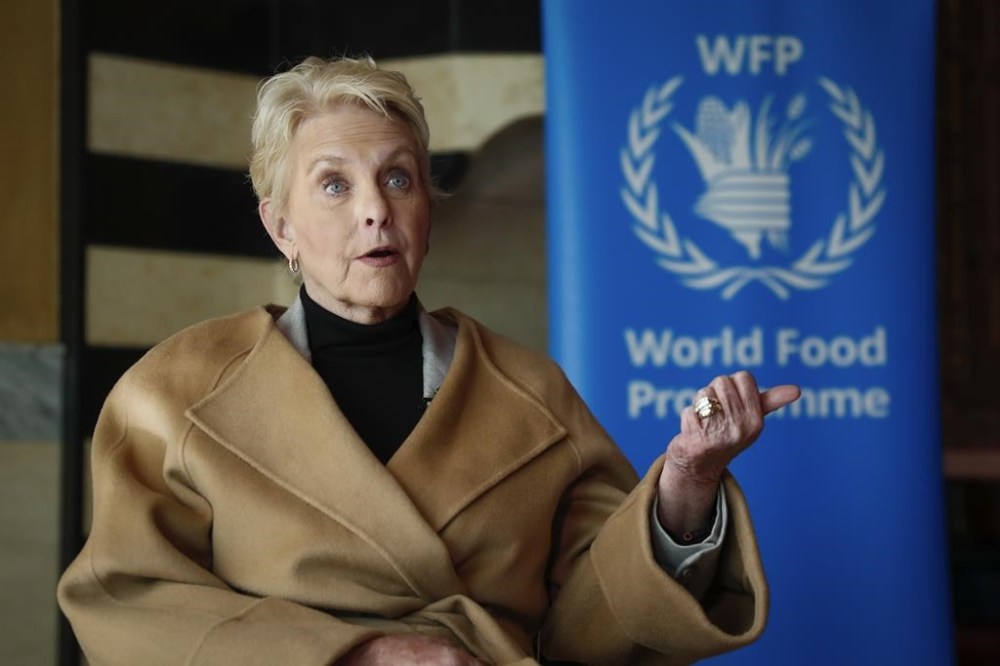UN food agency says some donors are hesitant to fund urgent Syrian aid under the new authorities
Advertisement
Read this article for free:
or
Already have an account? Log in here »
To continue reading, please subscribe:
Monthly Digital Subscription
$1 per week for 24 weeks*
- Enjoy unlimited reading on winnipegfreepress.com
- Read the E-Edition, our digital replica newspaper
- Access News Break, our award-winning app
- Play interactive puzzles
*Billed as $4.00 plus GST every four weeks. After 24 weeks, price increases to the regular rate of $19.00 plus GST every four weeks. Offer available to new and qualified returning subscribers only. Cancel any time.
Monthly Digital Subscription
$4.75/week*
- Enjoy unlimited reading on winnipegfreepress.com
- Read the E-Edition, our digital replica newspaper
- Access News Break, our award-winning app
- Play interactive puzzles
*Billed as $19 plus GST every four weeks. Cancel any time.
To continue reading, please subscribe:
Add Winnipeg Free Press access to your Brandon Sun subscription for only
$1 for the first 4 weeks*
*$1 will be added to your next bill. After your 4 weeks access is complete your rate will increase by $0.00 a X percent off the regular rate.
Read unlimited articles for free today:
or
Already have an account? Log in here »
Hey there, time traveller!
This article was published 14/01/2025 (260 days ago), so information in it may no longer be current.
DAMASCUS (AP) — Some governments are hesitant to boost funding for urgent humanitarian needs in Syria under the country’s new interim rulers after the fall of former President Bashar Assad, the director of the U.N. World Food Program said Tuesday.
WFP chief Cindy McCain said Syria’s struggle with hunger is a national and regional security issue, especially as the country goes through a critical transition period.
“What’s at stake here is not just hunger, and hunger is big enough. But it’s about the future of this country and how it moves forward into this next phase,” McCain said in an interview with The Associated Press in her first visit to Syria after she met with the de facto government’s Foreign Minister Asaad al-Shibani.

Syria for over a month has been under a new de facto government led by the Islamist Hayat Tahrir al-Sham group, which led a lightning insurgency in December that overthrew Assad following nearly 14 years of conflict.
Humanitarian agencies including the WFP for years have decried budget cuts to programs giving aid to millions of people of Syria, where the U.N. estimates 90% of its population live in poverty, and more than half of its people – over 12 million – don’t know where their next meal will come from. The country’s critical electricity and water infrastructure is also battered by the war. The agencies have cited shrinking budgets and donor fatigue that worsened after the COVID-19 pandemic and the war in Ukraine.
Last year, WFP ended its main assistance program which helped feed millions of Syrians, and has been gradually cutting programs that fed millions of Syrian refugees in neighboring countries.
The war-torn country, under the rule of HTS leader Ahmad al-Sharaa, now is undergoing a transition that regional and international governments hope will bring about a new constitution, elections, and an inclusive political system.
McCain said she and al-Shibani discussed the urgent need to feed more people, as well as to make the country’s own food production more sustainable, including by improving its crippled water supply and boosting wheat farming.
“I think the government certainly is willing to work on that at least in the talks that I’ve heard today,” she said.
But funding remains a major issue.
With funds from Western countries shrinking, humanitarian organizations have increasingly turned to Arab governments, notably wealthy Gulf nations, for funding. While those countries have been quick to establish diplomatic ties with Syria’s new rulers, McCain said donors remain hesitant.
“It’s important that the Gulf countries particularly pay attention because this is their back yard,” said McCain. “We would like to see them more active in not just the short-term emergency needs but the long-term needs as well.”
Those governments and some aid agencies have also called for the lifting of Western-led sanctions in various parts of Syria that have restricted development work beyond aid handouts. Though most of the sanctions were on Assad and his associates, HTS and al-Sharaa are also sanctioned by Washington, Europe, and the UN.
Washington earlier this month eased some restrictions on Syria’s de facto government, including on some energy sales, for six months. The EU later this month is set to discuss the possibility of easing sanctions in moves tied to progress in Syria’s political transition.
McCain warned that the reluctance among donors to meet the needs of millions in poverty and food insecurity in Syria could have dire consequences, as the country goes through a critical phase.
“Food security is national security no matter where you’re at,” said McCain. “Hunger does not breed good will. We want to make sure people are fed and that their children have their ability to not just eat, but also go to school, and all the other things we want for a good society.”

